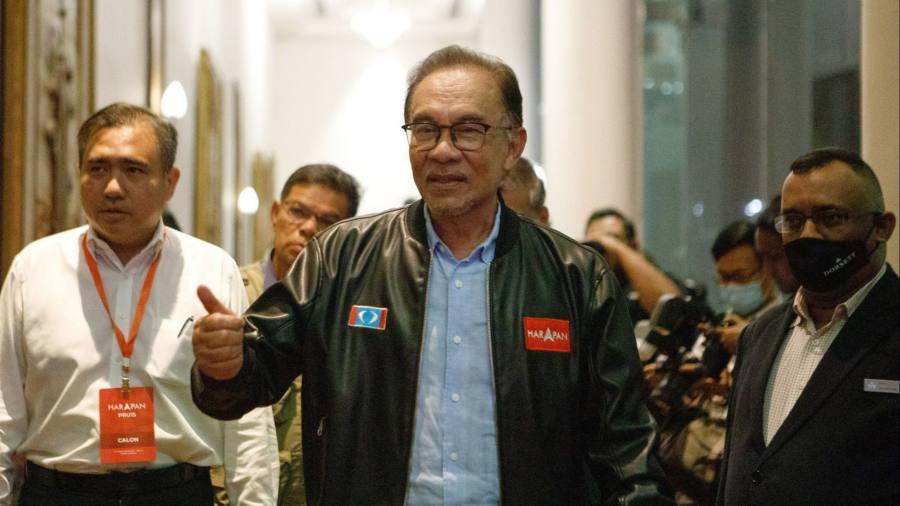
Malaysia’s rival political leaders are rushing to broaden their coalitions to secure a majority after an election on Saturday that produced the country’s first hung parliament and which cost nonagenarian ex-prime minister Mahathir Mohamad his seat.
The early general election was aimed at bringing about stability but has instead plunged the country into renewed political turmoil. Coalitions led by the main parties, including Prime Minister Ismail Sabri Yaakob’s National Front, failed to win a simple majority of 111 seats in the lower house, setting up the possibility of the country’s monarch playing an important role in breaking the deadlock.
The lack of a clear winner will complicate efforts by the south-east Asian economy to tackle slowing growth and rising inflation. Malaysia has struggled to draw a line under its tumultuous politics, marked by long-running rivalries and big personalities, with three leaders coming to power in three years.
Opposition leader Anwar Ibrahim’s Alliance of Hope was in the lead with 82 seats as of Sunday morning. Former prime minister Muhyiddin Yassin’s National Alliance had 73. Both leaders claimed they had the numbers to form a government.
Candidates for the premiership can forge new alliances to build a majority, as was done in the previous two governments. Malaysia’s king may also step in to determine who has the majority in parliament.
Ismail, who became prime minister in August last year, called an early election to build a stronger mandate. Many Malaysians have been frustrated with political instability, which they believe has hampered the country’s fragile recovery from the Covid-19 pandemic.
Instead the result was a rebuke of the United Malays National Organisation, the party of former leader Najib Razak, who is in jail over a sweeping corruption scandal at the state fund 1MDB. The Umno-led National Front trailed with just 30 seats.
Voters similarly rejected longtime leader Mahathir. The 97-year-old failed to keep his parliamentary seat, potentially ending the statesman’s seven-decade political career. Many Malaysians blame Mahathir for the current chaos after he unexpectedly resigned as prime minister in 2020.
If perennial challenger Anwar wins the top job, it would be a remarkable victory for the politician, who was jailed for sodomy and released in 2018. Mahathir had promised he would hand over power to Anwar, a foe-turned-ally, until the ex-prime minister resigned at the start of the pandemic.
“Parliament remains highly fragmented, and that will continue to be a source of instability,’‘ said Peter Mumford, south-east Asia analyst with Eurasia Group.
That said, the leading coalition in the next government, whether it is the National Alliance or Alliance of Hope, will be more dominant than the most recent one, he added.
“Umno party president Ahmad Zahid Hamidi and his faction — among the key instigators of political upheaval in recent years — will now be weakened after their spectacular own goal of pushing for snap polls then losing seats,” Mumford said.
Malaysians expressed apathy as voting began on Saturday. Chris, who is from the island of Penang but works in neighbouring Singapore in a nail salon, said she decided against returning home to vote.
“What’s the point?” said Chris, who only wanted to be identified by one name, shaking her head. “My family voted for Anwar. They think he is the most likely candidate to bring change. I’m not sure.”